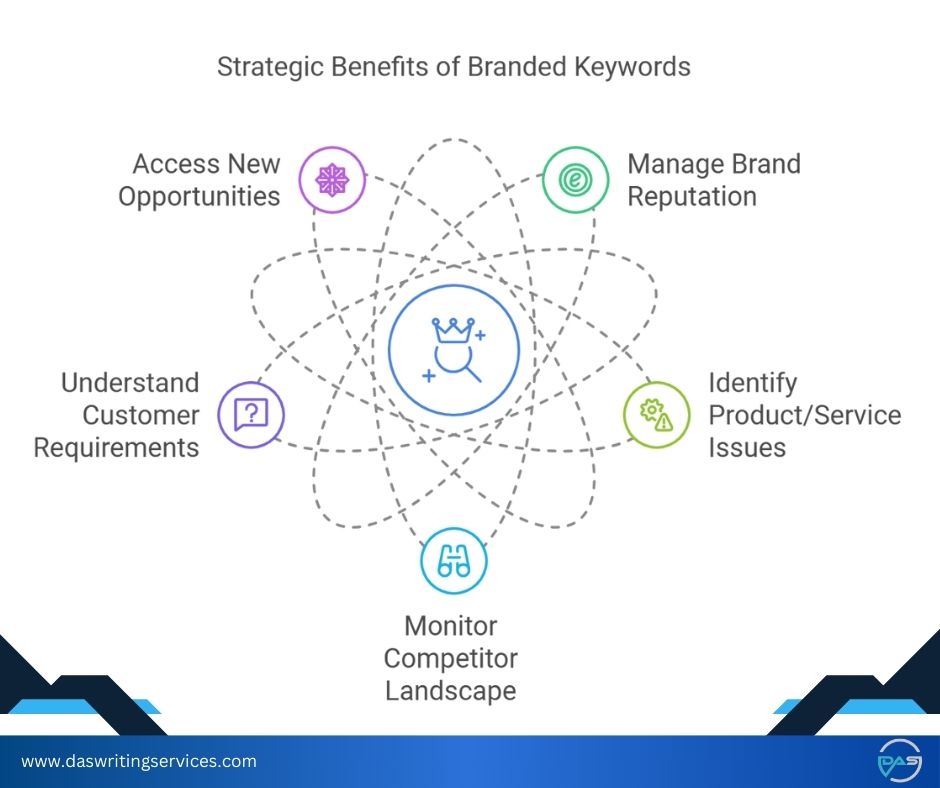Have you ever Googled your company’s website? If yes, you will search it using the brand name, commonly termed as branded keywords.
However, most marketers and SEO experts overlook the value of branded keywords. In the current marketing strategy, branded keywords offer immense value for organic search and brand value.
Let us explore what branded keywords are, their importance in building a brand and how you can use them to enhance brand visibility online.
What are Branded Keywords?
Branded keywords are unique search queries related to a specific brand, service, product, etc. Usually, branded keywords contain the brand names in them. For instance, Das Writing Services, Das Article Writing Services, Apple Watch 7, etc., are perfect examples of branded keywords.
Hence, brand keywords attract more customers and increase sales. According to a PwC report, 54% of global consumers prefer to obtain pre-purchase information through search engines.
What is the Importance of Branded Keywords?
As an SEO expert, it may seem counterintuitive to optimise the branded keywords for your business. However, branded keywords possess certain value when it comes to strategic marketing planning. Here, we have explained in detail the significance of branded keywords:

1. Management of Brand Reputation
As a company owner, you will want your brand narrative to have a significant impact on the search engine rankings, such as Google SERP. Hence, branded terms help in controlling such a narrative and ensure it reaches the right target audience.
The branded terms enable your products and services to rank well on the search engine and ensure the target audience gets positive information about you and your brand. It enables you to build trust, attract new audiences and influence their decision to purchase your service or product.
2. Identification of Product and Service Issues
One of the significant advantages of branded keywords is that they help in user evaluation and feedback about your product or service. It will help you determine the criticism and complaints the users report after using your product or service.
After spotting such instances, you can rectify the errors by fixing the problem at its roots. Moreover, you can hire a professional writer to craft unique content, keeping the branded keywords in mind. Hence, you must analyse the best keywords to upgrade your business’s online presence.
3. Monitoring Competitor Landscape
When you own a business and have a website, you must keep an eye on your competitors in terms of SEO. You can create better marketing strategies and campaigns by targeting branded keywords and determining the keywords your competitors use to rank on the SERP.
Moreover, you can follow their footmarks to analyse the branded terms they use to rank against the products and services. You can also create reliable articles or blogs with branded terms to outrank them and increase your brand visibility.
4. Understanding Customer Requirements
Proper targeting the customer requirements is crucial when it comes to an effective content marketing strategy. When you have a targeted strategy for your brand growth, it will have a relevant impact on your brand’s persona.
Moreover, understanding the customer requirements will enable you to align with the user expectations, resulting in more conversions. It will offer smoother communication with your audience and enable you to focus on customer interactions.
Therefore, using branded terms in content or on your website will positively impact your marketing strategies, increasing your brand’s reach.
5. Accessing New Opportunities
Your marketing team can identify new and unique business opportunities using the branded keywords. It will enhance your brand’s visibility and help in attracting new audiences to purchase your products and services.
For instance, you can create a new performance segment while perceiving the audience demand for searches with branded keywords. It will give you a scope to diversify your business reach and explore the paths that were not initially a part of your business plans.
How to Seek Branded Keywords?
Now that you have understood the significance of such keywords, you must learn the process of finding them for your business. Here are a few ways you can follow to find the brand terms according to your business industry:
1. Google Suggest and Autocomplete
One of the best ways to look for branded terms is using the Google search engine. To use this method, searchers can Google the brand name and look for the business name without pressing the enter button. You can see a bunch of branded terms suggested by Google.
In addition, you can see related phrases suggested by Google’s Autocomplete feature in this method. It indicates what the user is looking for after tying your company’s name to the search engine.
2. Related Searches
Another best way to look for such keywords is the ‘Search related to’ section on the search engine page. You can find this option at the bottom of the SERP, and it gives you an idea of the general queries people have related to your brand.
If you search for your brand, this will look much like the suggested phrases you have already uncovered. However, clicking on any of these suggested phrases will enable you to get in-depth knowledge and insights.
3. Using Specific Tools
Apart from these above methods, you can also use keyword search tools to seek branded terms aligning with your company. For instance, you can use branded keyword tools to get related terms, like Semrush, Moz, Ahrefs and Google Keyword Planner.
These tools enable you to get new ideas related to brand terms and understand their difficulty level. Moreover, when you use such tools, you can get the search volume of the related branded terms.
Difference Between Branded Keywords and Non-Branded Keywords?
The fundamental difference between the two is, branded keywords have the company, product or service name in the keyword. For example: ‘Das Writing Company’ is a branded keyword that includes our organisation’s name.
On the contrary, non-branded keywords are general phrases that refer to the product and services. For instance, ‘100% human written content’ is one of our non-branded keywords.
Find below the full difference between the two:
| Branded Keywords | Non-Branded Keywords |
| Tends to have lower search volumes | Comparatively higher search volumes |
| Able to drive relevant branded traffic that generate qualified leads | Drives general traffic which may not always turn into qualified leads |
| Have lower CPC and competition | Have higher CPC and are more competitive |
| Branded keywords ensure higher brand awareness and targets loyal audience | Non-branded keywords target general audience and consequently targets a wider group with less brand familiarity |
| Target bottom of the funnel (bofu) audience | Targets top of the funnel (tofu) audience primarily |
With all these attractive qualities of a branded keyword, the choice seems pretty easy, right?
Not really!
While branded keywords are surely an attractive target to sell specific product or services, they also can be lower in numbers. As a result, conversions may also be lower. Despite the difference between branded and non-branded, a mixbag of both branded and non-branded keywords are usually the best option for qualified leads as well as to target newer audience and consequently clients.
How to Optimise Branded Keywords for SEO?
As a business owner, you must ensure the branded keywords you use for visibility are properly optimised and generate tangible results. The following are a few ways you can identify and drive branded queries for your businesses.
1. Identify Branded Keywords
The initial step for implementing an SEO strategy for branded terms will be to find out what they are. In simple terms, you must identify and finalise your brand keywords.
For instance, you can research with the SEO keyword planner tools and find what you can rank for in keywords and variations according to your business domain.
2. Select the Targeted Keywords
As part of your keyword research strategy, you must select the keywords for brand identity and choose the ones you want to appear in search results. There are two possible ways in which you can do this.
One of the ways is to analyse the underperforming keywords that need a ranking at the top. Then, determine whether you can do anything to optimise the content result to drive more traffic to the webpage.
Another way is to identify keywords ranking at the top without relevant content. Then, use such keywords and write about them, gaining a better understanding of what users want who seek out those keywords.
3. Add Internal Links
Internal linking guides search engines and users as they navigate through your site, improving navigation and boosting SEO performance. You can effectively distribute page authority throughout your site by implementing a robust internal linking strategy.
It makes it simpler for search engines to recognise the significance and relevance of your keywords. Moreover, integrating relevant anchor texts establishes connections between related pages, ultimately enhancing their visibility in search results associated with your brand name.
4. Manage Knowledge Panel
Knowledge panels are the information boxes that you can see on the search engine result page. These panels offer key details of the brands. If you want to claim the knowledge panel for your brand, you can verify the representation through your Google Business page.
After claiming the knowledge panel, you can submit regular edits to update the information. In addition, optimising the knowledge panel helps the audience to get complete and accurate information, reflecting the authenticity of your business.
5. Brand Inclusion in Your Site
Another way to optimise branded keywords for SEO is to integrate your brand keywords and the multiple iterations of your brand name of all your products and services throughout your website.
For instance, you can incorporate them into title tags, header tags, body content, and alt tags of your images. However, you must ensure that you do not overdo your branded terms and it must be noticeable.
Common Mistakes to Avoid while Optimizing with Branded Keywords
These are significant tools to boost your company’s SEO and brand visibility. However, you must avoid some common issues when you want to use branded keywords to create content:
1. Overstuffing Branded Terms
One of the primary things you must avoid when optimising branded keywords is overstuffing, which feels unnatural.
Overloading your content with branded keywords can harm user experience and may result in penalties from search engines, ultimately affecting your website’s SEO. You can use the branded terms naturally and strategically to avoid overuse.
2. Ignoring User Intent
If your strategy for keyword optimization does not match the user’s search intent, your content may not effectively engage or convert visitors, thus wasting your SEO efforts for your brand.
Hence, you must avoid using keywords without considering the intent behind the search terms. You can craft content according to the specific requirements and expectations behind your branded search terms.
3. Ignoring Branded Keywords Performance
If you do not monitor metrics such as search volume, click-through rates, and conversion rates, you may overlook chances to enhance your branded keyword SEO. Not consistently monitoring the performance of your brand terms in SEO campaigns can hamper the optimisation process.
You can utilise tools such as Google Analytics to monitor the performance of your branded keywords. In addition, regularly review and refine your strategy to ensure that your branded keywords generate the desired results.
4. Neglecting Competitor Analysis
Failure to pay attention to how competitors utilise keywords in their SEO strategies can be detrimental. By neglecting competitor insights, you may leave vulnerabilities in your own branded keyword strategy, which could enable others to attract your audience.
To address this, consider employing tools such as Ahrefs or SEMrush to assess the branded keywords your competitors are ranking for. In addition, these strategies can help you enhance your brand keyword strategy, allowing you to compete more effectively.
5. Focusing Only on Branded Keywords
Focusing solely on branded words while disregarding non-branded keywords can create limitations. Such an approach narrows your audience to only those familiar with your brand, potentially overlooking new customer opportunities.
A balanced strategy incorporating both branded and non-branded keywords can expand your reach and enhance brand visibility. Moreover, it contributes to a more comprehensive keyword strategy.
Takeaway
Branded keywords are a significant part of any successful SEO. By prioritizing them, you can strengthen your brand’s online visibility, attract targeted traffic, and boost conversion. They help you engage not only the users who are already aware of your brand but also strengthen your brand identity across digital platforms.
However, avoiding some of the most common mistakes in keyword overusing and overlooking the user’s intent will help you achieve all the benefits of your branded keyword approach.
You will enhance your brand presence online by realising the power of branded keywords and following the right steps. Moreover, you can bring in qualified traffic and ultimately achieve bigger success with your digital efforts. Embrace it as a core part of your brand SEO solution and watch your online presence and awareness go up.
Frequently Asked Questions
1. Should I use branded keywords?
Bidding on branded keywords guarantees that your brand’s content will be prominently displayed at the top of search engine results pages (SERPs). Such enhanced visibility can result in higher click-through rates (CTRs) since users are more inclined to click on the first few results, especially when actively searching for a specific brand.
2. What is an example of branded keywords?
A branded keyword is a keyword or search term containing a brand or product name or a variation of it. For instance, when a user enters “Das Content Writing Services” in the search bar, it qualifies as a branded keyword. In such a scenario, the user is specifically looking for a particular brand and not just any writing agency.
3. Why are branded keywords crucial for SEO?
Branded keywords are crucial for SEO as they help reach potential customers who are already aware of the brand and have a higher probability of purchasing. A working branded keyword strategy sets up the scene for building and reinforcing your brand presence comprehensively and, in essence, creating and maintaining brand loyalty.
Subhodip Das is the founder and CEO of Das Writing Services Pvt. Ltd. He has an experience of 12 years in the field of Digital Marketing and specialises in Content Writing and Marketing Strategies. He has worked with well-established organisations and startups helping them achieve increased Search Engine Rank visibility. If you want to grow your business online, you can reach out to him here.




Leave a comment